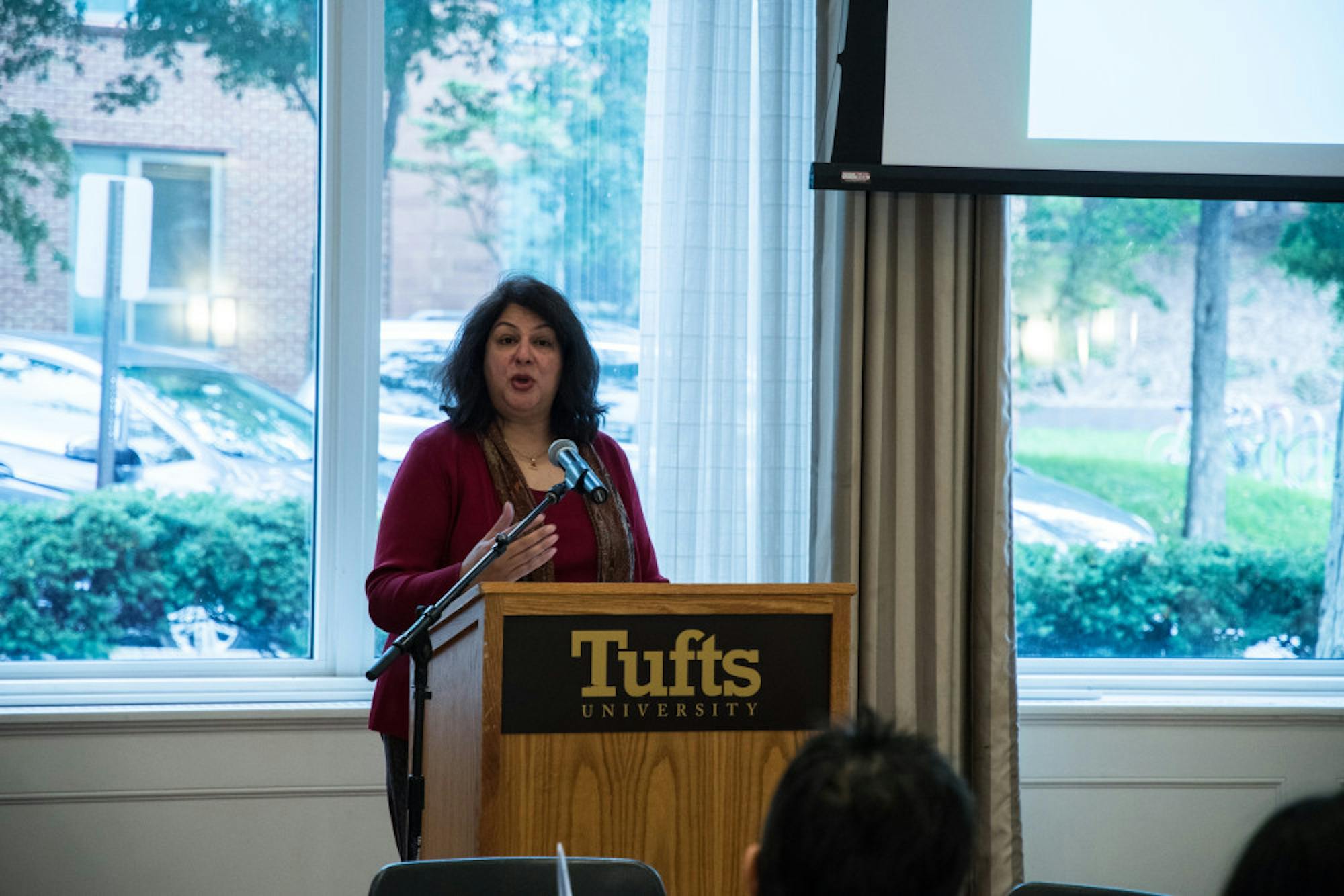Students gathered in the Alumnae Lounge Monday for a talk on the power of accents in American media. The event, titled “Accented America: Race, Difference, and Power" and hosted by the Asian American Center, featured Shilpa Davé, an assistant professor of media studies and American studies at the University of Virginia.
Linell Yugawa, director of the Asian American Center, explained that students began to plan programming on the topic after an op-ed on South Asian accents was published last spring. Posters advertising Davé's talk noted that the event was also held in celebration of a revamped Asian American Center which no longer houses students and is open to all.
Davé began her talk by emphasizing that it would be about South Asian accents, particularly those of South Asians who are represented in the media as Indian or Indian-American.
Davé explained the complexity of accents.
“Accent is related to language and the way it is pronounced, or language that can be linked to a geography, a social class and nation," Davé said. "It is an identifier based on sound and sound production rather than visual cues.”
She noted that studying accents can reveal racial and power dynamics and differences, especially for immigrants who are trying to obtain citizenship.
“For immigrants in the United States and those who are deemed foreign, the ability to speak English has been a marker of citizenship,” Davé said.
Davé emphasized that an accent's cultural context can affect its perception.
"To speak American not only means to speak English in a particular way, but also to have cultural references and cultural context,” she explained.
She then used the Indian character in "The Simpsons" (1989–), Apu Nahasapeemapetilon, as a specific example of accent performances in popular culture. The portrayal of Apu, performed by Hank Azaria (LA '87), Tufts’ 2016 Commencement speaker, sparked controversy for Azaria's use of a racialized, South Asian accent.
Davé showed a clip from a 1996 episode of "The Simpsons," in which Apu talks in a 'white' voice rather than his previous 'brown' voice. According to Davé, Apu’s accent is used for comedy.
“[His accent is used] is to promote difference and congenial differences because you laugh at the difference — his inability to speak English in a particular way, or the way in which the words sound,” Davé explained. “Apu is translated into an individual who is not taken seriously because of how he talks.”
Davé also provided an example of Azaria speaking without the animation.
“When you suddenly see Hank Azaria’s face speaking those words, they take on a very different connotation,” she said. “I think it is very powerful to say that without the animation, that probably would not have happened unless he was wearing brownface makeup."
"When you are looking at the history of these images, and you can see them ... when he is talking in that particular way, he is participating [in the] racialization of a particular view,” Davé added.
The issue with Apu, Davé emphasized, is that he was one of the only Asian-American characters on television in the late 1990s.
“This is the only character for a long time," she said. "Producers and directors ask for this particular voice, regardless of who is speaking, to racialize South Asians."
Discussing Asian-American and Asian actors, Davé emphasized that they are trained to speak with a certain accent.
“Asian-Americans and Asian actors are being coached; their teachers are reinforcing the stereotype, rather than going into some of the new ways of thinking about accents,” she said.
Davé also used NBC's "Outsourced" (2010–2011), a series about a white character who moves to India to supervise his company's outsourced call center business, as an example.
“While Indian-American characters appear as the lone racial presence or lone racial sidekick on several TV shows, ... 'Outsourced' makes all the characters, or all sidekicks anyway, Indians.”
Davé explained the history and impact of call centers from the late 1990s. She describes call centers, which many American companies have opened in South Asia, as a “critical site” for analysis on “brown voice” and how accents are used to introduce racialization outside of U.S. national borders.
"The American accent, not just fluency in English, is a commodity for Pakistani workers," Davé said. "American English is the language and the dialect to know and master in relation to global capital and trade.”
Davé also emphasized that accents require cultural knowledge and understanding of American culture, and that audience complaints about them stem from a lack of that cultural knowledge. She noted that large businesses and call centers overseas were created for British and American customers. The businesses operate on a model that does not reveal their workers' identity, and instead places emphasis on the familiarity of cultural references to the customer, such that customers feel like they are talking to operators from their own culture.
Davé complimented "Outsourced" and its illustration of the complexity and variety of accents.
"'Outsourced' demonstrates the complexity of American attitudes towards globalization,” she said. “What we see [in 'Outsourced'] is how a global world is portrayed in an American context.”
Davé ended the talk by considering why there has been a resurgence in discussions on accents.
“Why do accents suddenly come to the forefront again when we are hearing all different languages?” she asked. “It is related to the idea of the advance of technology.”
Shilpa Davé delivers talk on South Asian accents, media representation

Shilpa Davé, assistant professor of media studies and American studies at University of Virginia, delivers a talk titled 'Accented America' in Alumnae Lounge on Sept. 24.





